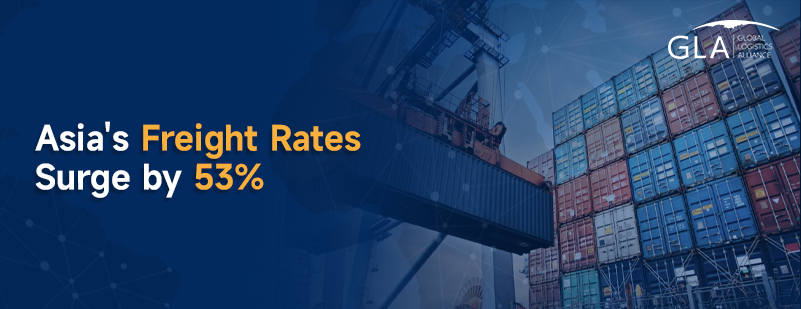Welcome to GLA! Leading the global logistics alliance.


Your location:Home > News > Asia's Freight Rates Surge by 53%
Time:2024-02-19 Publisher:Kevin Num:5730

Freight rates originating from Asia have witnessed a staggering surge of 53% in just one month, as per the latest data from Freightos. This unprecedented increase is attributed to a combination of factors, including disruptions in major shipping routes and significant decisions made by industry giants. Notably, container shipping titans and the oil super major British Petroleum have temporarily ceased transit via the Red Sea-Suez Canal route following recent attacks.
The disruption gained heightened importance due to its impact on the Bab-el-Mandeb Strait, a critical passage connecting the Mediterranean Sea to the Arabian Sea through the Red Sea and the Suez Canal. This vital route handles approximately 30% of global container traffic, and India heavily relies on it for trade with regions such as West Asia, Africa, and Europe.
Recent reports indicate that the majority of insurance companies have taken a cautious stance, refusing to provide coverage for shipments traversing the Red Sea. The trigger for this risk aversion was an incident where Houthi militants based in Yemen targeted the Palatium III, a Liberian-flagged ship, with an anti-ship ballistic missile. In response, some insurers have introduced a substantial war risk surcharge of US$5,200, levied in addition to the regular freight charges.
Madhavi Arora, lead economist for Emkay Global, shed light on the repercussions of the soaring freight costs through the Red Sea and the Suez Canal. The industries most affected by this development include oil, gas, automotive, chemicals, and logistics. Arora emphasized that while the flow of oil and gas to India, predominantly sourced from the Persian Gulf, may not be severely hampered, there could be implications for Russian oil flows from the Black Sea, which might require rerouting.
The geopolitical tensions leading to the disruption in the Red Sea-Suez Canal route have sent shockwaves through various sectors. The oil and gas industry, which plays a crucial role in India's energy needs, faces challenges in terms of potential rerouting of Russian oil flows. The logistics sector, already grappling with global supply chain issues, is further burdened by the sharp increase in freight rates. Automobile manufacturers and chemical industries, reliant on timely and cost-effective transportation of goods, are likely to experience an additional strain on their operational costs.
As the world closely watches the developments in the troubled waters of the Red Sea, stakeholders across industries are strategizing to mitigate the impact of these disruptions. The surge in freight rates underscores the interconnectedness of global trade and the vulnerability of supply chains to geopolitical events. In this complex landscape, adaptability and resilience will be key for businesses navigating the challenges posed by the current disruptions in Asia's freight routes.
Prev:Welcome! Membership Renewal from UAE ———— ANCHORAGE SHIPPING LINE LLCNext:Welcome! New Golden Member from Turkiye ———— ORCA LOGISTICS
Recommended Membership
Latest News